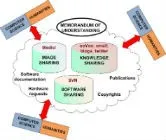Maarten de Rijke (UvA), Ridho Reinanda (KITLV, eHg)
Maarten de Rijke (UvA), Ridho Reinanda (KITLV, eHg)
Why Is Digital Humanities Interesting For A Computer Scientist?
In the talk we explain and illustrate how search and analysis problems that emerge from the research activities of digital humanities scholars give rise to interesting research challenges for computer scientists. What are the search processes of digital humanities scholars? To which extent do our current search algorithms support these processes? It turns that digital humanities practices ask for new approaches to many aspects in the information retrieval process. These include querying, exploring, ranking as well as interaction patterns. One of the key messages is that, as long as intelligent information access for digital humanities scholars is still an unsolved problem, successful digital humanities research teams consist of scientists from both the humanities and computer science alongside tool developers. The talk will be supported by evidence from cases studies in media studies and ongoing work in the Elite Network Shifts project.
Presentation slides Maarten de Rijke
Presentation slides Ridho Reinanda
Bio’s
Maarten de Rijke is full professor of Information Processing and Internet in the Informatics Institute at the University of Amsterdam. He holds MSc degrees in Philosophy and Mathematics (both cum laude), and a PhD in Theoretical Computer Science. He worked as a postdoc at CWI, before becoming a Warwick Research Fellow at the University of Warwick, UK. He joined the University of Amsterdam in 1998, and was appointed full professor in 2004.
De Rijke leads the Information and Language Processing Systems group, one of the world’s leading academic research groups in information retrieval. During the most recent computer science research assessment exercise, the group achieved maximal scores on all dimensions. His research focus is on intelligent information access, with projects on social media analytics, vertical search engines, machine learning for information retrieval, and semantic search.
A Pionier personal innovational research incentives grant laureate (comparable to an advanced ERC grant), De Rijke has generated over 35MEuro in project funding. With an h-index of 44 he has published over 500 papers, published or edited over a dozen books, is (associate) editor for various journals and book series, and a current and former coordinator of retrieval evaluation tracks at TREC, CLEF and INEX. He is co-chair for SIGIR 2013 and general chair for ECIR 2014.
He is the director of the University of Amsterdam’s Intelligent Systems Lab (ISLA), its Center for Creation, Content and Technology (CCCT), and a board member for the Ad de Jonge Centrum voor Inlichtingen- en Veiligheidsstudies.
The retrieval and language technology developed by his research group is being used by organizations around the Netherlands and beyond, and has given rise to various spin-off initiatives.
Information and Language Processing
Intelligent Systems Lab Amsterdam
Center for Creation, Content and Technology
Ad de Jonge Centrum voor Inlichtingen- en Veiligheidsstudies
Ridho Reinanda
Ridho Reinanda is a PhD candidate at KITLV (Royal Netherlands Institute of Southeast Asian and Caribbean Studies) and Institute for Informatics, University of Amsterdam. He is currently joining the e-Humanities group to work on the Elite Network Shifts project. In this project, he will to try to extract the social network of elites in Indonesia from a large collection of historical news archive.
He received his bachelor degree in informatics engineering and master in informatics/computer science from Institut Teknologi Bandung. His research experience started as a student assistant in programming lab and later as a research assistant in the language processing group STEI-ITB. His main research interests are information retrieval, information extraction, natural language processing, and machine learning.
Before starting the doctoral study, he also worked as a software entrepreneur, developing various applications for government and private institutions. His previous works include implementing document management, digital libraries, and data collection & aggregation systems.

